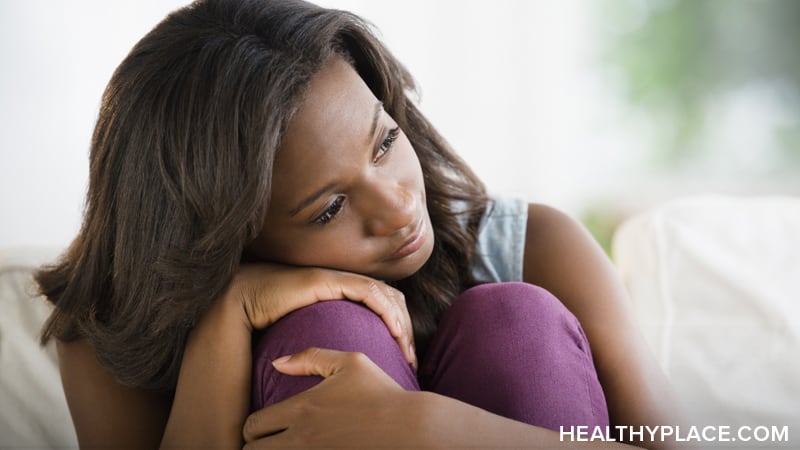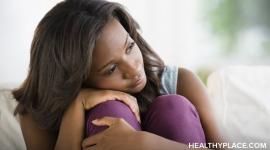Depression and Your Period: What You Need to Know

Depression during your period, month after month, is frustrating to deal with. Experiencing depression on your period is largely caused by hormonal fluctuations that occur as a normal part of the menstrual cycle. In the week or two leading up to your period, and lifting shortly after your period, you might experience a pervasive sadness, irritability, anxiety, a loss of interest in activities you normally enjoy, sleep problems, and weight changes—all symptoms of major depressive disorder. Does this mean you have clinical depression for a week or two a month? Possibly, but not necessarily. Here’s what you need to know about depression and your period.
Depression Before Your Period: Why Does It Strike?
Mood changes with your menstrual cycle are annoying, but they’re a normal part of the process. Menstruation is your body’s way of preparing for pregnancy. At the beginning of your cycle, your ovaries prepare to release an egg. When an egg is mature, it’s released to journey through the fallopian tube and into your uterus. If it’s fertilized by a sperm on the journey, it will attach itself to the lining in your uterus that has been forming all month. If it isn’t fertilized, it will travel out of your body and the uterine lining will follow suit. Minor bleeding happens when the lining detaches from the walls of the uterus. This is your period, and then the cycle begins anew.
What does this have to do with depression? Plenty. Several hormones drive the entire menstrual cycle. Two primary hormones are estrogen and progesterone. Their levels fluctuate during the month, which affects neurotransmitters in your brain like serotonin, dopamine, norepinephrine, and endorphins. These affect mood and emotional regulation. As they change throughout the monthly cycle, your mood can, too, if you are sensitive to hormonal shifts that happen in your brain and body (UNC Healthcare, 2008).
It’s estimated that about 40 percent of women are sensitive to these hormonal shifts and experience physical and mental symptoms, including depression symptoms, every month starting mid-cycle with ovulation and ending with the onset of their period. Among these women, the nature of depression varies greatly.
Depression and Your Period: Just a Bad Mood, or Something More?
The experience of depression before a period is different for each person. Some women experience only mild symptoms, a few days of being slightly down in the dumps and grouchy. Others, though, have clinical depression that is life-disrupting for one to two weeks every cycle.
Moderate depression that is bothersome but doesn’t shut you down is often part of premenstrual syndrome (PMS). A more severe form of PMS that affects approximately five- to 10 percent of women (UNC Medical School, n.d.) is called premenstrual dysphoric disorder (PMDD). PMDD can be extremely disruptive and cause women to miss work or school, withdraw from friends or family, cry frequently, and even have difficulty getting out of bed and otherwise practicing self-care. When their period begins, these symptoms disappear, but they return in the middle of the next cycle.
About 40 percent of women who seek treatment discover that there is more to their cyclical depression than PMS or PMDD (UNC School of Medicine, n.d.). In these cases, the issue is not menstrual-related depression but an underlying mood disorder that is made worse by hormonal fluctuations each month.
If you experience monthly depression symptoms, it’s important to talk with your doctor about what is happening. Whether you experience very mild depression with your menstrual cycle, or you have PMS, PMDD, or an underlying mood disorder, there are things you can do to lessen depression’s impact on your life.
Treating Depression and Your Period: What You Need to Know
Different treatment approaches can help you minimize depression during your period. Your doctor can help determine what may be most effective for you. The different treatment options give you control over what’s happening in your body and include such things as:
- Antidepressants, particularly selective serotonin reuptake inhibitors (SSRIs) to minimize depression symptoms or hormonal birth control to reduce hormonal fluctuations and help prevent depression symptoms from occurring
- Proper nutrition, including complex carbohydrates, calcium, magnesium, and omega-3 fatty acids as well as cutting processed foods, excessive sugar, and caffeine (see "List of Best Foods for Fighting Depression")
- Daily exercise
- Getting enough sleep
- Practicing self-care through activities like meditation, yoga, journaling, and pursuing a hobby you enjoy
- Working with a therapist to help you change your thoughts and process your emotions
If you experience depression before your period, know that it’s part of your normal cycle rather than a weakness or character flaw. Know, too, that you don’t have to put up with it. Talk to your doctor for recommendations on how to feel better.
APA Reference
Peterson, T.
(2022, January 3). Depression and Your Period: What You Need to Know, HealthyPlace. Retrieved
on 2026, January 14 from https://www.healthyplace.com/depression/women/depression-and-your-period-what-you-need-to-know



